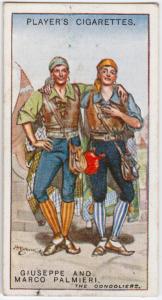Hardened operetta fans have good reason to feel lucky this Friday the 13th: it is the 169th anniversary of the birth of Sir Arthur Sullivan, whose music put wings on the House of Lords, enchantment in the Vicar’s teapot, and wind in the sails of the Pinafore. Those who love W.S. Gilbert, Arthur Sullivan and the fourteen operas they wrote together remain as passionate as they were a century ago, as a glance at Savoynet or the Gilbert and Sullivan Archive will tell you.
Savoy scholarship has recently flowered: the past two years alone have seen The Cambridge Companion to Gilbert and Sullivan, Carolyn Williams’ landmark Gilbert and Sullivan: Gender, Genre, Parody, Regina B. Oost’s Gilbert and Sullivan: Class and the Savoy Tradition 1875-1896 (a thorough examination of the commodification in, of, and around the operas) and The Japan of Pure Invention, in which Josephine Lee considers the racial implications of The Mikado‘s production history.
Sullivan himself always longed to be appreciated for his serious compositions. If you wish to explore his depth and range, the Loeb’s record stacks offer recordings of his grand opera Ivanhoe and his cantata The Golden Legend. Among the Victorians, this setting of Longfellow’s poem of true love, evil and redemption was second in popularity only to Handel’s Messiah. For more Sullivan without Gilbert, try The Beauty Stone or The Emerald Isle or The Contrabandista. Or sample his wildly popular parlor songs, including his setting of Kipling’s Boer War appeal “The Absent-Minded Beggar” and the inevitable “Lost Chord.”
If only Sullivan’s entire legacy had had as faithful a guardian and as staunch a promoter as his work with Gilbert did. For over a hundred years the family-run D’Oyly Carte Opera Company staged the Savoy operas in accordance, as nearly as possible, with Gilbert’s directions, providing an enduring link with the original productions. Performance styles may have evolved a little: we invite you to compare, say, the 1928 Yeomen of the Guard with the 1958 and 1964 versions, and then hear a non-D’Oyly Carte interpretation, like the 1993 recording with Bryn Terfel and Thomas Allen. The 1966 taping of The Mikado offers a chance to see John Reed, Kenneth Sandford, and other D’Oyly Carte stars in their prime. Sadly, rising costs and the Arts Council’s infamous denial of funding caused the D’Oyly Carte to close in 1982, and it is hard to hold the LP of the company’s final concert without a sigh and a tear in the eye.
If you need a fix right now and cannot make it to the library to hear our G & S discography, Naxos Music Library offers subscribers a variety of goodies while the Internet Archive’s treasure trove (which includes the notorious Groucho Marx Mikado) is available to all. I cannot let the occasion pass without mentioning With Words and Music, a bizarre but entertaining B movie about a bookie who mounts a comeback for a washed-up troupe of Savoyards. You imagine a team of desperate screenwriters, robbed of their rest in some dingy, labyrinthine studio basement, cranking out the script at 4 am after discovering a mutual love of melodious topsy-turvydom. Interesting recordings and sheet music (scroll down for all the Sullivan: they have him under “Arthur” and “Arthur S.” and just “Sullivan” and everything) are free to all at the Library of Congress, as well. Sullivan did his duty; I have done mine. Go ye and do yours!
-Sarah Barton
